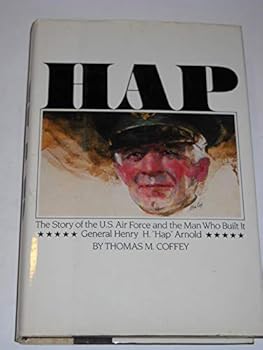Hap
Select Format
Select Condition 
Book Overview
No Synopsis Available.
Format:Hardcover
Language:English
ISBN:0670360694
ISBN13:9780670360697
Release Date:October 1982
Publisher:Viking Books
Length:416 Pages
Weight:1.10 lbs.
Customer Reviews
1 rating
The perfect man for the job
Published by Thriftbooks.com User , 19 years ago
One of World War II's greatest ironies is that the Germans, known for their planning and efficiency, ran a horrible Air Force. The Luftwaffe, despite its iconic name, was a one-trick pony whose overweight sybaritic Commander in Chief (Goering) disdained everything logistical and drove any chance Hitler might have had into the ground. The United States Army's Air Force, on the other hand, was a model of exceptional planning and execution, never forsaking the fundamental for the flamboyant. And it was Hap Arnold's indefatigable advocacy for both the potential and realization of the Air Force that led to the insuperable Allied air dominance of World War II. Thomas Coffey's "Hap" tells the story of a man whose sunny disposition belied the tense, restive nature of a commander who would not tolerate the palaver of an interwar Armed Forces whose complacency led to so dramatic a reduction in strength that when Germany invaded Poland, the United States' army ranked as just the 17th largest in the world. In 1907, the Signal Corps established an aviation division and Hap Arnold was one of two young officers sent to Dayton to learn directly from the Wright Brothers themselves. Arnold, who had once entertained dreams of the cavalry, found the study and exercise of flight intoxicating. He continued moving up the ranks and became Colonel at just the age of 31. During the interwar years, Arnold found himself embroiled in some of the most caustic internecine battles that shook the Armed Forces. Hap strongly backed Billy Mitchell and after the aviation pioneer's court-martial thought he too would be next to go. Arnold provoked further ire through his honest, if too earnest, scuttles with the Navy. The Navy's vitality was being threatened by the emergence of air power, and not surprisingly, admirals saw things entirely differently. Hap Arnold's greatest contribution to the war effort was his single-minded pursuit of the training of men and production of aircraft. Where Goering neglected air transport because it didn't fit into his imagination of the air pilot as urbane warrior of the skies, Arnold looked beyond the image and into the stark reality that aircraft needed fuel and men...and lots of both. While Goerring allowed the cessation of Germany's development of the four-engine bomber in 1937, Hap Arnold battled tirelessly to push for greater and greater production of B-17, B-24's and the B-29...even when the isolationist political climate of the 1930's resisted his demands every step of the way. According to conventional wisdom, 4-engine bombers were for offensive warfare and since America wasn't going to be involved in any such movement ever again, why waste the money? Finally, Arnold's strategic contribution to the war effort cannot be overlooked. Churchill and the British, incensed at Berlin's indiscriminate bombings, wanted to reciprocate, for the ostensible reason of hiding bombers under the cloak of darkness, but for the more probable purpose of gi






